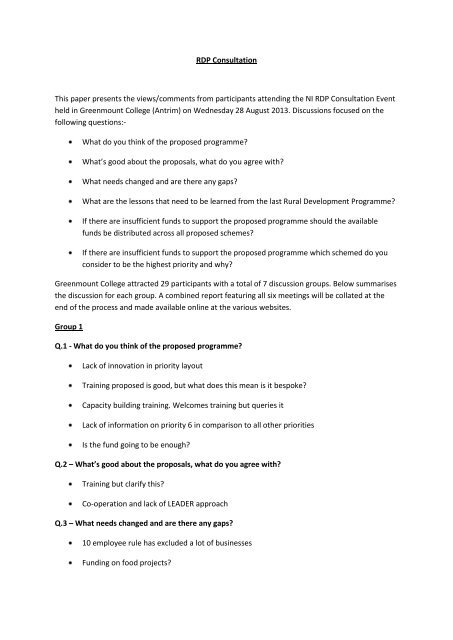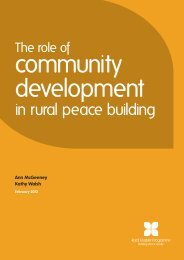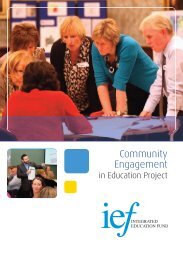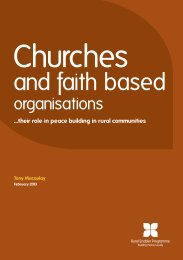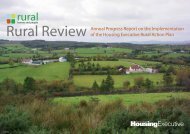Greenmount RDP seminar notes - Rural Community Network
Greenmount RDP seminar notes - Rural Community Network
Greenmount RDP seminar notes - Rural Community Network
- No tags were found...
Create successful ePaper yourself
Turn your PDF publications into a flip-book with our unique Google optimized e-Paper software.
<strong>RDP</strong> Consultation<br />
This paper presents the views/comments from participants attending the NI <strong>RDP</strong> Consultation Event<br />
held in <strong>Greenmount</strong> College (Antrim) on Wednesday 28 August 2013. Discussions focused on the<br />
following questions:-<br />
What do you think of the proposed programme?<br />
What’s good about the proposals, what do you agree with?<br />
What needs changed and are there any gaps?<br />
What are the lessons that need to be learned from the last <strong>Rural</strong> Development Programme?<br />
If there are insufficient funds to support the proposed programme should the available<br />
funds be distributed across all proposed schemes?<br />
If there are insufficient funds to support the proposed programme which schemed do you<br />
consider to be the highest priority and why?<br />
<strong>Greenmount</strong> College attracted 29 participants with a total of 7 discussion groups. Below summarises<br />
the discussion for each group. A combined report featuring all six meetings will be collated at the<br />
end of the process and made available online at the various websites.<br />
Group 1<br />
Q.1 - What do you think of the proposed programme?<br />
Lack of innovation in priority layout<br />
Training proposed is good, but what does this mean is it bespoke?<br />
Capacity building training. Welcomes training but queries it<br />
Lack of information on priority 6 in comparison to all other priorities<br />
Is the fund going to be enough?<br />
Q.2 – What’s good about the proposals, what do you agree with?<br />
Training but clarify this?<br />
Co-operation and lack of LEADER approach<br />
Q.3 – What needs changed and are there any gaps?<br />
10 employee rule has excluded a lot of businesses<br />
Funding on food projects?
Clarity on how small food production can be supported like all other rural businesses –<br />
Annex 1?<br />
Childcare – no reference to it<br />
Youth – what encouragement is there?<br />
Funding for resource schemes which would help programmes for excluded groups<br />
Q.4 – What are the lessons that need to be learned from the last <strong>Rural</strong> Development Programme?<br />
Need for more information in the delivery mechanicals to feedback on how it works<br />
Need for synergy with EU funding programmes<br />
Q.5 If there are insufficient funds to support the proposed programmed should be available funds<br />
be distributed across all the proposed schemes?<br />
See below<br />
Q.6 – If there are insufficient funds to support the proposed programme which schemes do you<br />
consider being the highest and why?<br />
Questions 5 and 6 have been answered together<br />
There should be an analysis of need with the same benchmark for all priorities<br />
Additional Information<br />
Group 2<br />
Legal issues need to be approached so that an appraised so that an informed opinion can be<br />
given on the priorities<br />
Request for business plans would be reviewed as could be seen as a barrier to apply<br />
What are the arrangements for the lapse between this programme and the next<br />
programme?<br />
How does this impact staff?<br />
Definition of rural and population sizes and location of ‘rural businesses’<br />
Q.1 - What do you think of the proposed programme?<br />
Generally good however, concern over timescale<br />
Last programme - not enough money<br />
Concern over new funding pot considering ROI funding V’s N.I. Programme<br />
paperwork/process very difficult to access
Opinions on ‘correct terminology’ – huge fees from consultant<br />
Concern over money from single farm payment to fund community elements of <strong>RDP</strong><br />
Concern over admin costs for delivery of programme<br />
Q.2 – What’s good about the proposals, what do you agree with?<br />
Percentage of grant is too low<br />
Capital grants 40% are good<br />
Barrier to renewable energy particularly wind turbine if successful on renewable participant<br />
should have choice to send back or keep<br />
Q.3 – What needs changed and are there any gaps?<br />
Countryside management – current scheme not enough money and too specific around<br />
ESA/scientific, revert back to the old scheme, farmers have habitat etc in place<br />
Forestry expansion scheme, land too expensive and not enough revenue<br />
More money to form competitive – lift money from pillar 1 to pillar 2<br />
Q.4 – What are the lessons that need to be learned from the last <strong>Rural</strong> Development Programme?<br />
If money is spread too thin then this is not good. Reduce priorities if money is cut<br />
Farming to be a priority, use evidence of current programme ton uptake and take from that<br />
Q.5- If there are insufficient funds to support the proposed programmed should be available funds<br />
be distributed across all the proposed schemes?<br />
See below<br />
Q.6 – If there are insufficient funds to support the proposed programme which schemes do you<br />
consider being the highest and why?<br />
Broadband is too slow/too many black spots/satellite broadband<br />
More cross-departmental approach to schemes<br />
Village renewable – coal – ripples out to farms and land owners<br />
Advice/help from DARD – and/or other agencies such as <strong>Rural</strong> Support <strong>Network</strong><br />
Guidance note must be written in ‘Plain English’<br />
Common sense approach to funding<br />
Too provide incentives to encourage younger farmers to take on responsibility<br />
Sustaining and possible expansion of small businesses
Group 3<br />
If candidates were right then farmers would start new businesses in association with their<br />
businesses.<br />
Q.1 - What do you think of the proposed programme?<br />
COMPLICATED – too much technical jargon<br />
Farmers may lose out to rural groups<br />
Criteria needs to clearly set out<br />
Q.2 – What’s good about the proposals, what do you agree with?<br />
Positive rural funding is required<br />
Knowledge and information transfer required<br />
Business scheme welcomed<br />
Q.3 – What needs changed and are there any gaps?<br />
No gaps<br />
Q.4 – What are the lessons that need to be learned from the last <strong>Rural</strong> Development Programme?<br />
Don’t overfund the areas where the money cannot be delivered set the criteria and stick to<br />
the criteria<br />
NICMS are inaccessible – simplify please<br />
Q.5 If there are insufficient funds to support the proposed programmed should be available funds<br />
be distributed across all the proposed schemes?<br />
See below<br />
Q.6 – If there are insufficient funds to support the proposed programme which schemes do you<br />
consider being the highest and why?<br />
Group 4<br />
Training and knowledge transfer<br />
Farming and competitiveness<br />
Modulation money RIMS fenced for agriculture<br />
Promoting resource efficiency<br />
Sustainable job creation in private sector<br />
Simplify the process
Q.1 - What do you think of the proposed programme?<br />
Not enough to enhance the rural community<br />
A lot pointed to farmers, larger percentage of dwellers not involved in agriculture<br />
Transport – lack of public transport, needs to be factored into current proposals<br />
Car necessity – higher costs associated with rural living, deprivation/fuel<br />
Potential opportunity to maximise rural assets and create more sustainable living<br />
Opportunity for social farming<br />
Market towns and contribution to rural hinterland for services.<br />
Q.2 – What’s good about the proposals, what do you agree with?<br />
Quite a lot to support agriculture industry<br />
Knowledge transfer good – potential for social farming need to be cross cutting and<br />
networking<br />
Support co-operation, this is seen as a particular challenge for farmers<br />
Q.3 – What needs changed and are there any gaps?<br />
Mobile masts/broadband<br />
Next generation of young people – they can miss out on opportunities<br />
Expanding existing services/shared services – increased funding<br />
Promoting rural life/living – create a vision<br />
Equity of provision<br />
Recognition of volunteers – financial cost<br />
Q.4 – What are the lessons that need to be learned from the last <strong>Rural</strong> Development Programme?<br />
Match funding – consider financial engineering./paperwork/ timescales – too tight<br />
Invest NI don’t advertise fact support for new businesses – LEADER offers much more to<br />
SME<br />
Q.5 If there are insufficient funds to support the proposed programmed should be available funds<br />
be distributed across all the proposed schemes?<br />
Should prioritise and give right amount of money<br />
Look at ways to collaborate
Bring in additional funding<br />
Q.6 – If there are insufficient funds to support the proposed programme which schemes do you<br />
consider being the highest and why?<br />
Group 5<br />
Priority 6 - Farmers to recognise the value the rural development can bring for all<br />
Q.1 - What do you think of the proposed programme?<br />
Middling – more potential in it<br />
Divides farming from rural development/same people.<br />
Q.2 – What’s good about the proposals, what do you agree with?<br />
Potential for good – CAFRE training good idea but it becomes a process overload. Should be<br />
needs based not full requirement<br />
Business Invest Scheme training essential – another barrier for access<br />
Business planning training must be necessary<br />
Is 100% training budget a sure way to spend money if it is made compulsory to be trained to<br />
get funded (cynical view but a reality)<br />
Tourism – very few private sector applications other than accommodation<br />
Knowledge transfer – should be part of priority 6, not just training and not just agriculture<br />
training<br />
The knowledge transfer is needed across farm diversification, community groups, tourism –<br />
all areas not just agriculture based<br />
Measures around a learning journey for tourism product<br />
DARD need go much further for cross departmental integration DETI/DSD etc<br />
Need to link across priorities (food and tourism) (culture/communities/tourism)<br />
Village renewable allowed communication/council/stat to co-operate, this was good<br />
Operating rules caused difficulties 50:50 rule only applies in rural area<br />
Can’t paint private buildings in rural areas but can in urban areas – these are confusing rules<br />
Co-operation/border is inter-regulated priority not for this programme<br />
This is not a farming programme but a programme for the whole community, needs<br />
fertilization between the pillars
Village renewal should have been more about business/economic renewal etc, not just<br />
flower pots etc<br />
Need councils/NIHE to be involved. Some learning from urban regeneration project<br />
experience<br />
Lack of flexibility – crosscutting themes should allow more work to be done bit the rules are<br />
tightening.<br />
People in audit/monitoring/delivery/policy/partners should sit down and agree not to be<br />
driven by audit – it is over audited.<br />
LAGS had no autonomy – DARD has to step back and believe in the power/responsibility of<br />
decision making of the LAG – they have to reduce control.<br />
Q.3 – What needs changed and are there any gaps?<br />
Institutional memory gets lost – knowledge and skills are being lost<br />
Q.4 – What are the lessons that need to be learned from the last <strong>Rural</strong> Development Programme?<br />
Need to know if LAG formation can happen in parallel to the programme negotiation be<br />
ready to go when the programme is approved<br />
Can’t afford a delay between it being negotiated and implemented<br />
Programme is too stand alone and it has to link across all the government departments and<br />
work with them<br />
Q.5 If there are insufficient funds to support the proposed programmed should be available funds<br />
be distributed across all the proposed schemes?<br />
See below<br />
Q.6 – If there are insufficient funds to support the proposed programme which schemes do you<br />
consider being the highest and why?<br />
A lot of money that was transferred was taken out of 3.2 (small business) at a time of<br />
economic difference so it was given to the public sector – hard to defend<br />
Spend driven should not be allowed to happen<br />
Strategic project procedure was wrong - took money from the private sector and gave it to<br />
the public sector, this was wrong<br />
Private sector – 50% inequality with public getting 75%<br />
If we deliver through a leader approach, we can give higher rates of grants – get more to<br />
spend (should be push delorian rule) should support leader
Group 6<br />
Key learning is how important villages are for rural hinterland. Villages are missing banks/key<br />
services<br />
If programme allows young farmers to get 60% (more than stated 40% could something be<br />
done for small businesses if they are young farmers/women priority groups.<br />
Level of grant should be proportionate to the scale of the project<br />
Level of red tape should also be proportionate – fast track – higher level of upper limit<br />
proportionate with ROI<br />
Leaving of auditing should be proportionate to the grant aid<br />
Applying for grants was a nightmare and it put people off<br />
Animation and support is essential and needs to start now<br />
Animation and support can’t be left to the RSIO’s to provide<br />
If invest NI are expected to support the <strong>RDP</strong> 2013 – they need to gear up to deal with this<br />
client group as they don’t currently and they need to be consulted<br />
We can fund projects in businesses over 10 people but that needs to be raised to 50 –<br />
inconsistent with farms which could have 1700 employees<br />
ANC – the SDA and DA distinctions are missing, where is the DA?<br />
LEADER qualifies for a higher level of grant – DARD should encourage LEADER<br />
Succession funds to keep expertise in LAGS – transition funding<br />
Q.1 - What do you think of the proposed programme?<br />
Focus farming – selection process flawed<br />
Q.2 – What’s good about the proposals, what do you agree with?<br />
Why limit the number if people allowed being involved in discussion groups – targeting<br />
smaller development farmers.<br />
Q.3 – What needs changed and are there any gaps?<br />
Social clauses – priority 6 – employee young people/apprenticeship<br />
Q.4 – What are the lessons that need to be learned from the last <strong>Rural</strong> Development Programme?<br />
Lessons – current programme has no focus on youth or youth development<br />
Succession for farms?
Setting up for the first time, how is this defined?<br />
Have to own land, have farm business ID?<br />
Village Plans – inclusive of community, not solely done by consultants - perhaps done by<br />
support organisation<br />
Q.5 If there are insufficient funds to support the proposed programmed should be available funds<br />
be distributed across all the proposed schemes?<br />
MET scheme – agreed to continue – positive. Flexibility to move monies from priority to<br />
priority and within schemes within priorities<br />
Training – first and foremost, prior to getting money to agriculture environment funding<br />
Renewable – connection – NIE.<br />
How can we ensure possible to deliver renewable schemes where the connection is not<br />
good?<br />
The infrastructure is not adequate, this needs to be upgraded<br />
Joined up with the government – planning, DETI DEL – training, investment *V.I.P*<br />
Positive feedback:-<br />
Prompt in terms of consultation, but need to push on. Not too much of a gap between<br />
existing and new programme<br />
LAGS – is 10 too many? Or should we make use of new structures<br />
Positive knowledge transfer and innovation, general basis is good<br />
Recommendations, learning:-<br />
Bureaucracy/accessibility of the programme<br />
Potential for upfront funding, ensure good projects<br />
Can avail of funds:-<br />
Paper work/procurement needs to be simplified<br />
Need for technical support, designated organisation to support<br />
Funding levels – minimum 50%<br />
Increasing from max 10 employees to max 50 employees (2 tiers – small/larger scale)<br />
Group 7<br />
Q.1 - What do you think of the proposed programme?
The proposed programme is very comprehensive – there is a lot to take in<br />
The detail is missing especially information regarding budgets and the monetary allocation<br />
as this will make a substantial difference.<br />
Training aspect good and the fact that is 100% funded<br />
Tourism good focus on co-operation especially with other strategies in tourism.<br />
Co-operation with NITB is a priority, there needs to be a stronger link<br />
Q.2 - What are the lessons to be learned from the last <strong>Rural</strong> Development Programme?<br />
Certain areas were excluded in <strong>RDP</strong> programme which are rural areas which need assistance<br />
e.g. Ballyclare, ruled out due to population size. Ballyclare is a town in the country with no<br />
urban sprawl<br />
There needs to be greater clarity on what is a rural community e.g. 75% of business is rural<br />
related<br />
Small towns need to analysed on their own merits – find a different way to define rural<br />
Q.3 In relation to the lessons, what needs changed, are there any gaps?<br />
The process (assessment and procurement) needs to be simplified; there was too much<br />
bureaucracy and red tape, rules and regulations<br />
They need to be there but in addition to flexibility when required without diminishing the<br />
programmes integrity<br />
Assessment has to be made on a project by project basis<br />
There is also a need to revert to proper leader policy<br />
More detailed, definitive initial applications and financials submitted at time of application<br />
This will maybe lead to less loo’s are not being taken forward. Applicants need help, and<br />
they need help in some cases with match funding, and the provision of guidance with likely<br />
sources of match funding<br />
Upfront funding to start the projects without overly strict clauses. Someone with a good<br />
idea may need handholding through application and procurement<br />
Handheld facility identified with Priority 1 – mentors, innovation type person also required.<br />
Also simplified application and assessment process for smaller funding amounts e.g. under<br />
£5K<br />
Food processing/small food producers are not included in the current funding and should be<br />
100% grants for networking currently 75%
Q.4 What’s good about the proposals, what do you agree with?<br />
Poverty and social isolation, glad to these this issue being prioritised and focused on<br />
Q.5 If there insufficient funds should all the funds be distributed across all proposed schemes? Or<br />
are there priority schemes, what are they and why?<br />
Priorities – <strong>Rural</strong> broadband and opportunities to share experiences, mobile communication<br />
in rural areas<br />
Small business communities – online but need the support and education to ensure this<br />
happens. Helping people/businesses have access to hardware and software to do this<br />
Farming community – knowledge transfer- SME’s<br />
North /South cooperation has to be available to everyone not just the border areas<br />
Final Comments<br />
How is the programme going to be made workable? Need to know spend and the details<br />
Processes identified, how to keep LAG’s from current programme


